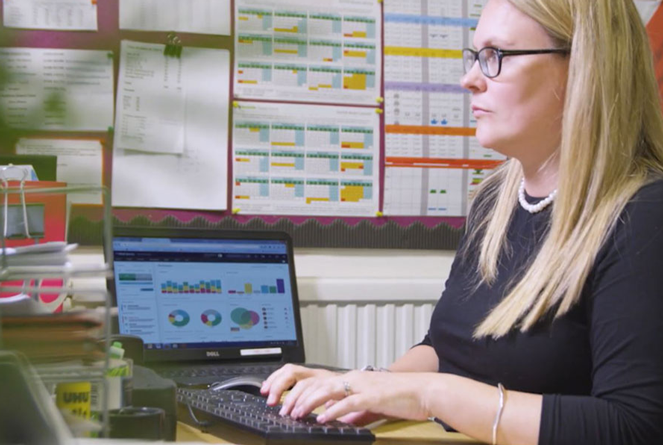Introduction
As we approach the final term of the school year, staff well-being and workload continue to be high on the national agenda.
The workload reduction task force published its initial recommendations in January 2024, and the final set of recommendations is due to be published shortly. TES has also published its annual school well-being report, and staff well-being is a focus for the government.
In this blog, written by education expert Maria Thomas, we’ll look at the results of TES’ latest report and discuss the current picture of education. Almost 7000 school staff participated in this year’s survey, which covers the following areas:
- Confidence, enjoyment, and motivation
- Workload and work-life balance
- Funding and resources
- Communication, feedback, and development
- Engagement and pride
- Relationships and support
Confidence, enjoyment, and motivation
There has been a dramatic increase in staff positivity around this area. 75% of school staff felt “confident in their ability to perform their role”. 45% of staff also felt they had the “autonomy to make their own decisions”. Although this initially looks like a positive picture, we also need to look at the other side of the coin. The well-being report showed that 39% of school staff “didn’t find their work fun.” More importantly, some staff stated they wanted to feel useful, and others wanted time to do their job properly. They felt that 3 periods to plan, prepare and mark for all classes was nowhere near enough.
Workload and work-life balance
In the survey, workload continues to be a concern. 61% of school staff stated their “workload is not manageable”, even though 50% of participants reported that their school had reduced marking. 36% reported that their school has implemented behaviour management software to save time and that their schools have streamlined staff meetings. Workload stress increases in certain key roles in school. 78% of SENCOs reported that their workload is not manageable, reflecting the current national picture of increasing pupils with SEND (diagnosed and undiagnosed) and the high levels of administration associated with this. This result is not particularly surprising given the frequently reported lack of resources, funding, and special school spaces. Furthermore, 71% of middle leaders reported that their workload was not manageable. School staff talked about flexible working, more administrative support to help lighten the load, and “centralising systems so organisational responsibilities did not just fall to individual teachers.”
Funding and resources
It will come as no surprise to read in this section that only 26% of staff felt their school had enough resources for them to do their jobs. 18% of participants reported that “their school had invested in resources to improve support in the classroom.” Participants felt that all school staff were doing all they could to “reduce costs and retain staff.” The message from this section was clear that this is not an individual school issue but a national problem around government funding.
Communication, feedback, and development
There is a clear difference in opinion between senior leaders and school staff in this area. 74% of senior leaders stated “that their school has a clear vision for the future,” whereas only 42% of teachers agreed with this statement. 16% of teachers “felt their voices were heard, " but this figure rose to 75% when senior leaders were asked the same question. 32% of participants “could see development opportunities in their role”, and only 14% of staff stated that their school “offers clear pathways for advancement”. Communication is key to all school staff, but only 20% of participants felt that their school had a strategy to “actively listen to their feedback.”
Engagement and pride
When you initially compare the results in this area from last year to this, there has been a rise, and staff are feeling increasingly proud of working in their individual settings, but when you look at the results a little deeper, they may not seem as clear-cut. Although we saw a 6% rise in staff recommending their setting as a place to work (37%) and 52% of staff were proud to work at their school, it is not as positive when you look at the breakdown between leaders and teachers. 74% of leaders were proud to work at their school, and 41% of teachers were proud to work at their school.
However, relationships with students continue to increase, with 78% of staff saying they have good relationships with them (a 6% increase from 2023). We know that professional development is also very important in supporting staff well-being. In this year’s survey, we saw a 16% increase in staff feeling they were working towards a goal that mattered to them (49%).
Unfortunately, only 30% of participants felt that their school prioritised professional growth.
Relationships and support
Similarly, when thinking about staff relationships and support, on the surface, it looks like there has been an increase in positivity, but once again, when you break the results down between leaders and teachers, the picture remains quite bleak.
- 37% of participants felt their leadership team makes good decisions. (+11%)
- 62% of participants felt their colleagues supported them (+9%)
- 74% of leaders felt the leadership team makes good decisions
- 27% of teachers felt the leadership team makes good decisions
- 28% of middle leaders felt the leadership team makes good decisions
- 55% of leaders felt supported
- 32% of teachers felt supported
One issue raised through the survey is that leaders do not really listen. Other areas of improvement included improving parental engagement, improving staff relationships, improving communication, and developing mentoring and coaching programmes.
Supporting your staff
One of the key messages from the survey this year is that although leaders are trying to take steps, there is still work to be done to improve staff well-being. Although staff feel more confident in their ability, we are seeing more and more contemplate leaving the profession entirely (74%). This dissatisfaction seems to be directed at the education sector rather than just individual settings. The important question is, ‘What can we do to truly support our staff?’
Below are just a few ideas that schools can implement, but we must remember that whatever we do, we must ensure that it positively impacts our staff’s well-being and that we listen to staff feedback. If an action is not having the desired impact, adapt or remove it.
- Lead from the front – implement a well-being policy or sign up for the staff well-being charter
- Have a clear vision and share this with your staff
- Implement a strategy to actively listen to feedback
- Implement an action plan following staff voice and regularly review this plan
- Implement or review your communication strategy. Actively use this
- Have clear pathways for progression
- Review your CPD programme – does it allow for personalisation?
- Increase opportunities for ‘connections’ among staff
In conclusion
In conclusion, TES' report highlights positive trends in staff confidence and pride but reveals ongoing challenges in workload, resources, and communication. Addressing these issues demands proactive measures, including workload management, resource allocation, and fostering supportive relationships. Prioritising staff well-being through clear policies, effective communication, and personalised development opportunities is essential.
By actively listening to staff feedback and implementing targeted strategies, schools can cultivate an environment where all staff feel valued and motivated. These efforts are crucial for sustaining a positive educational experience and retaining talented professionals in the field.
Explore Juniper’s support solutions today!
Staff are a school's biggest asset, so it's crucial to prioritise their well-being above all else.
Juniper provides a variety of well-being courses tailored to support schools, academies, and trusts.
Explore our dedicated courses here.
Or contact Maria directly at maria.thomas@junipereducation.org


/Primary%20school%20.jpg?width=2000&name=Primary%20school%20.jpg)








.png?width=940&height=788&name=Lingfield%20College%20Case%20Study%20(5).png)
-1.png?width=1000&height=833&name=National%20Association%20of%20Head%20Teachers%20(3)-1.png)
-3.png?width=1080&height=1080&name=Untitled%20design%20(10)-3.png)






